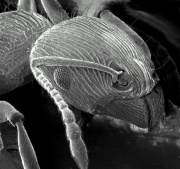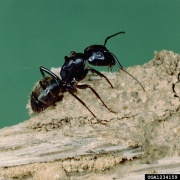Difference between revisions of "Ant"
(username removed) |
(username removed) |
||
| Line 2: | Line 2: | ||
== Description == | == Description == | ||
| − | Any member of over 8000 species of insect in the Formidicae family. Ants live in organized colonies generally separated into three classes of queens, males, and workers. Ants have a six legs, bent antennae, and a segmented body with large head, thorax, and abdomen. Their life cycle, from egg to adult, is 8 to 10 weeks. Adult worker ants can live up to 7 years. Ants are scavengers and feed on either plant or animal products. [http://cameo.mfa.org/materials/fullrecord.asp?name=Carpenter | + | Any member of over 8000 species of insect in the Formidicae family. Ants live in organized colonies generally separated into three classes of queens, males, and workers. Ants have a six legs, bent antennae, and a segmented body with large head, thorax, and abdomen. Their life cycle, from egg to adult, is 8 to 10 weeks. Adult worker ants can live up to 7 years. Ants are scavengers and feed on either plant or animal products. [http://cameo.mfa.org/materials/fullrecord.asp?name=Carpenter%20ant Carpenter ants] are one of the most damaging species to historic homes. Found in warm, moist climates, they damage wood by hollowing out spaces for nests. |
[[File:Blk.Carpenter_ant_forestryimages.org.jpg|thumb|Carpenter ant]] | [[File:Blk.Carpenter_ant_forestryimages.org.jpg|thumb|Carpenter ant]] | ||
| Line 23: | Line 23: | ||
== Additional Information == | == Additional Information == | ||
| − | Eric H. Smith, Richard C. Whitman, ''NPMA Field Guide to Sturctural Pests'', National Pest Management Association, Fairfax VA, 2005. | + | º Eric H. Smith, Richard C. Whitman, ''NPMA Field Guide to Sturctural Pests'', National Pest Management Association, Fairfax VA, 2005. |
== Additional Images == | == Additional Images == | ||
| Line 36: | Line 36: | ||
== Authority == | == Authority == | ||
| − | * | + | * Random House, ''Webster's Encyclopedic Unabridged Dictionary of the English Language'', Grammercy Book, New York, 1997 |
* ''The American Heritage Dictionary'' or ''Encarta'', via Microsoft Bookshelf 98, Microsoft Corp., 1998 | * ''The American Heritage Dictionary'' or ''Encarta'', via Microsoft Bookshelf 98, Microsoft Corp., 1998 | ||
| − | * ''Encyclopedia Britannica'', http://www.britannica.com Comment: "ant." | + | * ''Encyclopedia Britannica'', http://www.britannica.com Comment: "ant." Encyclopædia Britannica. 2005. Encyclopædia Britannica Premium Service 21 Jan. 2005 . |
* Wikipedia, the free encyclopedia, at http://www.wikipedia.com Comment: http://en.wikipedia.org/wiki/Ant (Accessed Jan 2005) | * Wikipedia, the free encyclopedia, at http://www.wikipedia.com Comment: http://en.wikipedia.org/wiki/Ant (Accessed Jan 2005) | ||
Revision as of 07:46, 24 July 2013
Description
Any member of over 8000 species of insect in the Formidicae family. Ants live in organized colonies generally separated into three classes of queens, males, and workers. Ants have a six legs, bent antennae, and a segmented body with large head, thorax, and abdomen. Their life cycle, from egg to adult, is 8 to 10 weeks. Adult worker ants can live up to 7 years. Ants are scavengers and feed on either plant or animal products. Carpenter ants are one of the most damaging species to historic homes. Found in warm, moist climates, they damage wood by hollowing out spaces for nests.
Synonyms and Related Terms
carpenter ant (Camponotus spp.)
Other Properties
Size range: about 2 to 25 millimeters (about 0.08 to 1 inch)
Color: may be be yellow, red, black, or brown
Body: head (large), thorax, abdomen (separated from thorax by 1-2 nodes)
Antenna: bent, usually the outer segments are larger forming a club
Legs: six, connected to thorax
Additional Information
º Eric H. Smith, Richard C. Whitman, NPMA Field Guide to Sturctural Pests, National Pest Management Association, Fairfax VA, 2005.
Additional Images
Authority
- Random House, Webster's Encyclopedic Unabridged Dictionary of the English Language, Grammercy Book, New York, 1997
- The American Heritage Dictionary or Encarta, via Microsoft Bookshelf 98, Microsoft Corp., 1998
- Encyclopedia Britannica, http://www.britannica.com Comment: "ant." Encyclopædia Britannica. 2005. Encyclopædia Britannica Premium Service 21 Jan. 2005 .
- Wikipedia, the free encyclopedia, at http://www.wikipedia.com Comment: http://en.wikipedia.org/wiki/Ant (Accessed Jan 2005)




